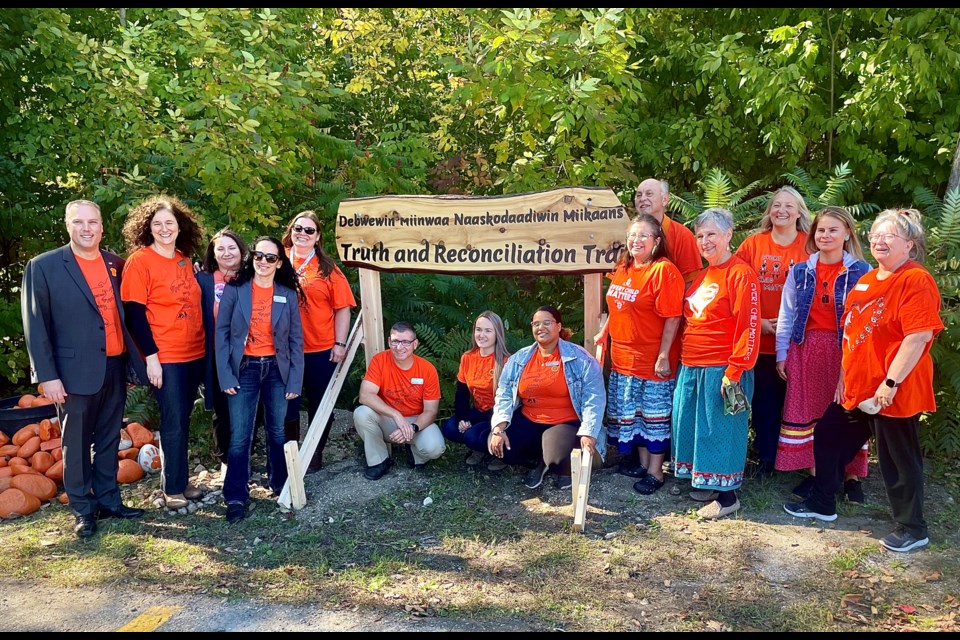Dozens gathered at the Georgian College Orillia campus Friday afternoon to unveil a sign for its Truth and Reconciliation Trail.
College officials, students, and Indigenous elders and leaders came together to participate in the event, which included the sign unveiling and lining the trail’s edges with orange stones as part of the National Day For Truth and Reconciliation.
The ceremony began with an opening prayer and remarks by elder Ernestine Baldwin, followed by statements from college officials and Serpent River First Nation’s Marilyn George drumming and singing ‘Wildflower’ in honour of Indigenous children and their families.
College officials hope the trail will serve as a reminder of the work that needs to be undertaken as Canada moves toward reconciliation.
“This trail, named the Truth and Reconciliation trail is here, hopefully permanently,” said Greg McGregor, Georgian College’s manager of Indigenous services. “It's a constant reminder of what work that we have to do together to find reconciliation.”
And, it's a step in the right direction, he said.
“What the college has done, and what everyone here has done by showing their support, is definitely a step towards reconciliation that we're all on together,” McGregor said. “This campus, our entire college, is committed to working towards reconciliation.”
McGregor said unveiling the sign and lining it in orange stones marks a step forward, as the trail had originally been named a year ago but did not bare any physical markers to indicate its purpose.
As people walk and reflect along the trail, McGregor hopes they will take steps toward reconciliation.
“Our vision is that at the end of the trail, (people) will come out more knowledgeable and more aware than when they entered the trail,” he said. “That's the hope, and if they keep going through the trail time after time, that awareness, that respect, that spirit of reconciliation, will spread out from the Truth and Reconciliation Trail to this town (and) the neighbouring communities.”
College president Kevin Weaver said the college, as well as the broader community, have a responsibility to engage in meaningful dialogue and change, whether it is uncomfortable or not.
“Today and every day is an opportunity for us to come together to support survivors, their families and communities,” Weaver said. “To those who are hurting, I invite you to connect with us and share how we might better support you on your healing journey.”
“For many of us, the truth is uncomfortable, but we have a responsibility to listen and a responsibility as individuals and as a college community to lead difficult conversations and continue towards reconciliation and meaningful change.”
The college’s Indigenous student advisor said her grandmother – a residential school survivor – would be proud of the work done at Friday afternoon’s gathering.
“I come to you here today as the granddaughter of a residential school survivor on my father's side, and as a great granddaughter of two residential school survivors on my mother's side,” said Ashley Lacourciere. “To me, really, it's a miracle that I'm here today, just as any of us Indigenous people are. I just think that is a huge testament to our strength as a people.
“I often times think what my grandmother would think of the work I do here at the college,” she said. “I think today she would be very happy–she would see Indigenous folks and allies gathered here together on this day, and she would be proud.”
An 'Indigenisation strategy' will be rolled out by the college later this fall, Weaver said, stressing it will be informed by the Truth and Reconciliation Commission’s Calls to Action.
“For us, these commitments are not performative – they're authentic steps forward as we learn and we unlearn together. They hold us accountable to disrupt the colonial processes and structures, and to resist the traditional erasure of Indigenous histories, stories, knowledge and language,” Weaver said.
“At the heart of our commitment is a desire to create a teaching and learning environment where everybody feels seen, heard, valued, and knows that they belong, where they can be their true selves and speak their truth," said Weaver.



